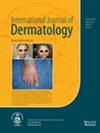LC-OCT for early diagnosis and characterization of dermatologic adverse events to oncologic drugs and correlation to histopathology
Abstract
Background
Targeted and immune therapies have recently been associated with the occurrence of multiple cutaneous toxicities, often challenging to differentiate by clinical examination alone without histology. Line-field confocal optical coherence tomography (LC-OCT) is a non-invasive and innovative imaging technique that has been shown to be almost as effective as histology in diagnosing several skin conditions. Our study aimed to assess the effectiveness of LC-OCT in predicting the clinical evolution of early maculopapular eruptions related to antineoplastic targeted therapy and immunotherapy.
Methods
In the period between May 2023 and December 2023, consecutive patients with clinical cutaneous maculopapular reactions caused by oncologic targeted therapy or immunotherapy were enrolled at the dermatologic outpatient clinic of the Fondazione Policlinico A. Gemelli IRCCS, Rome. Patients underwent clinical dermatological examination, video-dermoscopy, LC-OCT, and incisional skin biopsy of a target cutaneous lesion. To investigate the evolutionary pattern of maculopapular lesions (psoriasic eruption, lichenoid eruption, eczematous eruption, bullous eruption), LC-OCT and histopathological images have been compared based on specific characteristics (hyperkeratosis, acanthosis, spongiosis; papillomatosis; lichenoid inflammatory infiltrate; presence of intraepidermal/subepidermal cleavage plan with formation of a bulla).
Results
Eighteen patients were included in this study (11 males, 7 females, median age 64.5). LC-OCT demonstrated an overall concordance with histology of 77.8%, with a Cohen's Kappa of 0.69 (P < 0.0001). Sensitivity exceeded 70%, and specificity was ≥88.2%. The Area Under the Curve (AUC) ranged from 0.9 to 1 for psoriasis and lichenoid eruption and from 0.7 to 0.9 for eczematous and bullous eruption.
Conclusions
LC-OCT appears to be a promising tool for the early differential diagnosis of adverse skin reactions related to targeted therapy and immunotherapy, offering the potential to avoid skin biopsies in fragile cancer patients.


 求助内容:
求助内容: 应助结果提醒方式:
应助结果提醒方式:


